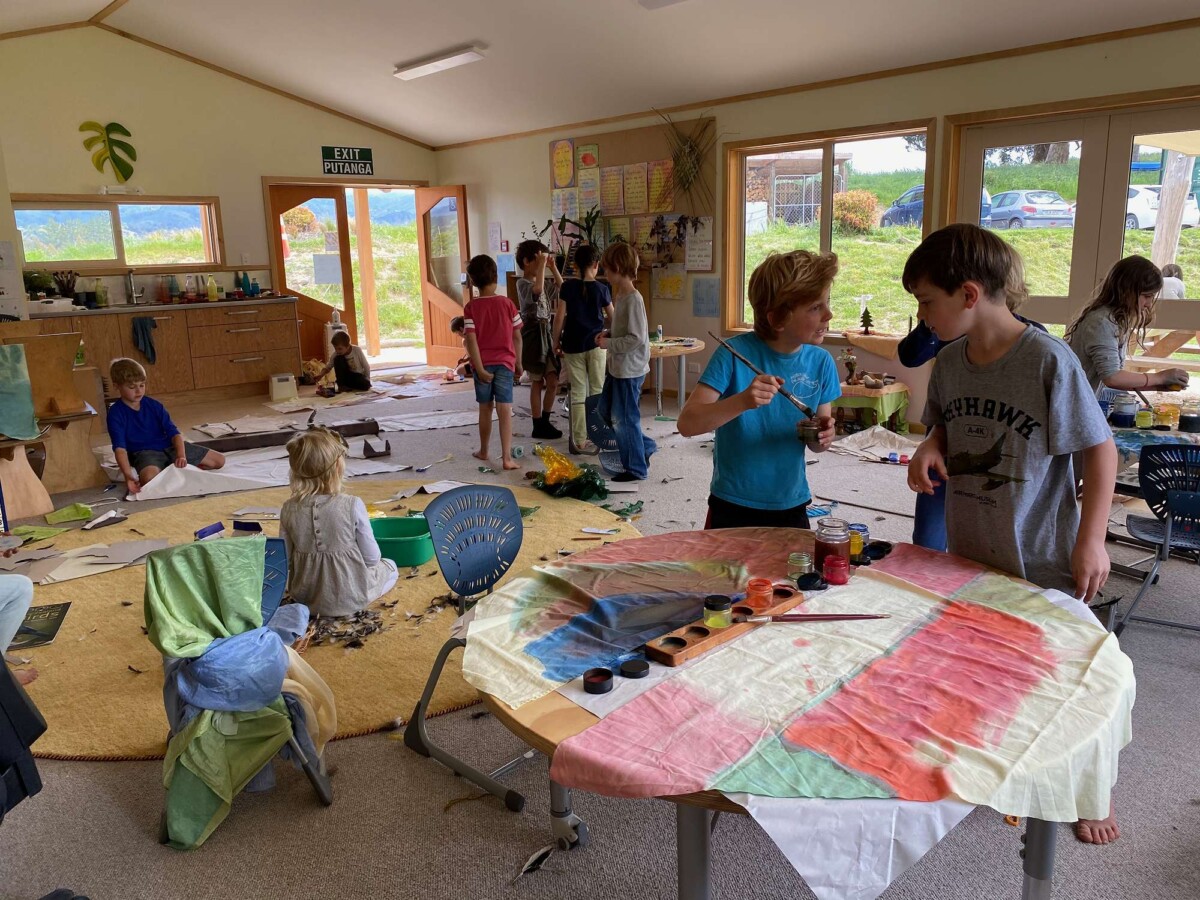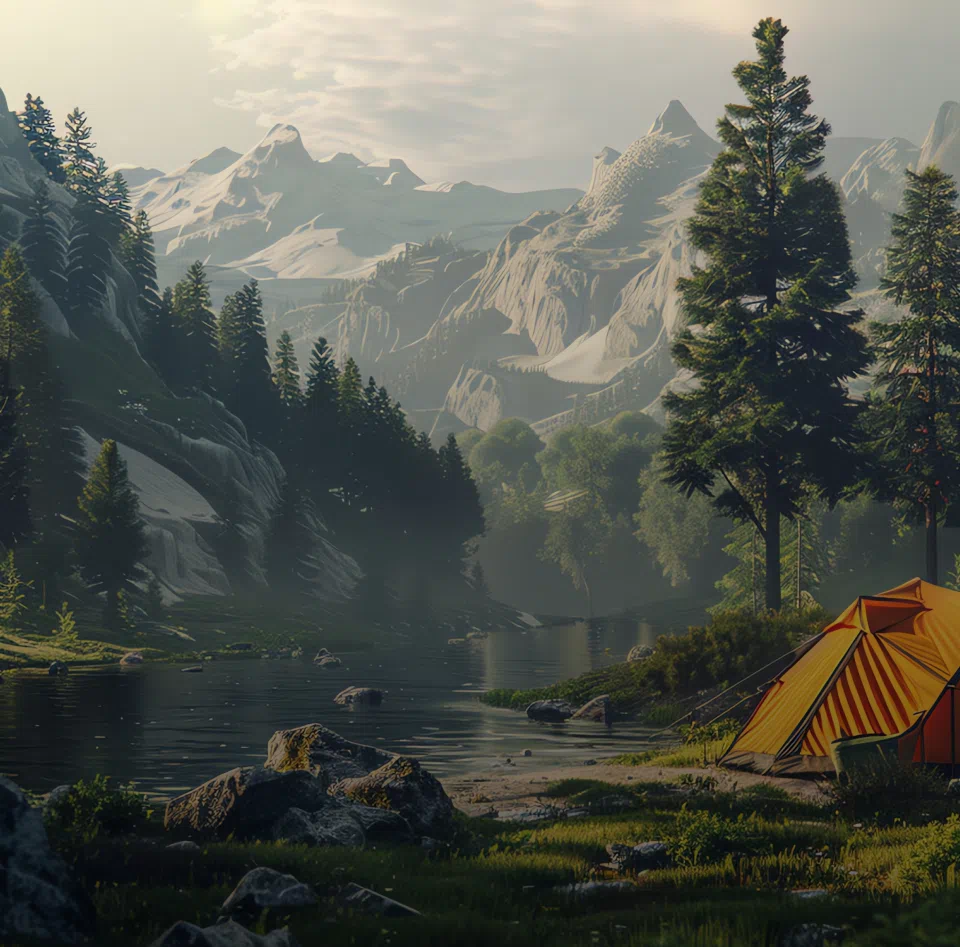Curriculum and Learning
Primary School Curriculum
Ideally in Class one, Waldorf students have a class teacher who will stay with them throughout primary school. The core curriculum taught by the class teacher is supported by subject teachers. The core curriculum and the subject classes are aligned with the students' development, as they progress through primary school.
Curriculum Themes
Class 1 (Year 2)
Story Curriculum: Fairy Tailes, Folk Stories, Nature Stories
Language Arts: Choral recitation, pictorial introduction and writing upper and lower case letters, sentence writing, oral storytelling, reading
Mathematics: Quality of numbers, counting forwards and backwards from 1-100, Roman numerals from I — X, odd/even numbers, four arithmetic processes, skip counting
Form Drawing: Straight and curved lines, standing forms, running forms
Handwork: knitting, purl stitch, adding and reducing stitches, correcting mistakes, hand sewing
Music: Singing in unison, recorder playing, playing by imitation
Visual art: beeswax, wet-on-wet painting
Drama: Re-enacting fairy tales, folk stories and nature stories.
Maori: Waiata, karakia, waiata-a-ringa, and mihimihi,
Festivals: Class preparation and celebration of festivals
Outdoor Classroom: Craft making with natural materials, basic fire skills, cooking on a fire, trips associated with main lesson studies
Farm to Table: Discovering living systems, gardening, composting, planting, worm farms
Movement: Ring games from around the world, skipping, beginning ball skills, balance, stilt walking, tagging games relay races, hula hoops.

Class 2 (Year 3)

Story Curriculum: Animal Fables, Legends of the Saints, Folklore, Local Stories, and Legends
Language Arts: Recitation, retelling stories, beginning composition, reading, punctuation, spelling, elements of grammar
Mathematics: Four arithmetic processes, place value, carrying/borrowing, number patterns, times tables, mental maths practice
Science: The nearby world around us
Form Drawing: Symmetry, reflection, running and rhythmical forms, spirals
Visual Art: Crayon drawing, beeswax modeling, wet-on-wet painting
Handwork: knitting, purl stitch, adding and reducing stitches, correcting mistakes, crocheting, hand sewing
Music: Singing in unison, recorder playing, playing by imitation
Drama: Re-enacting fables and legends, assembly performances
Maori: Waiata, karakia, waiata-a-ringa, and mihimihi,
Festivals: Class preparation and celebration of festivals
Outdoor Classroom: Craft making with natural materials, basic fire skills, cooking on a fire, trips associated with main lesson studies
Farm to Table: Discovering living systems, gardening, composting, planting, worm farms
Movement: Ring games from around the world, skipping, beginning ball skills, balance, stilt walking, tagging games relay races, hula hoops
Class 3 (Year 4)
Story Curriculum: Hebrew Myths and Legends, Maori Creation Myths
Language Arts: Speaking, composition, spelling, reading comprehension, basic parts of speech, punctuation, cursive writing
Mathematics: Time, measurement, weight, monetary calculations, times tables,
Science: Farming, agriculture, house building, people at work
Social Studies: Festival celebrations, ancient Hebrew culture, study of shelters through time,
Form Drawing: Circle divisions, expansion/contraction, complex forms
Visual Art: Crayon/coloured pencil drawing, wet-on-wet painting
Handwork: Knitting patterns with different colours, fair isle knitting, crocheting, hand sewing
Music: Recorder playing, introduction to musical notation, singing in unison
Drama: Class play
Festivals: class preparation and celebration of annual festivals
Maori: Waiata, karakia, waiata-a-ringa, and mihimihi commands, special nouns, and verbs
Outdoor Classroom: Basic fire skills, whittling, day tramps, shelter making, class camp
Farm to Table: Soil building, gardening, sprouting, harvesting, plant identification
Movement: Ball skills, folk dancing, handball games, relay races

Class 4 (Year 5)

Story Curriculum: Norse Mythology
Language Arts: Grammar, punctuation, verb tenses, descriptive and letter writing, cursive with fountain pen, poetry recitation, reading comprehension
Mathematics: Number patterns, times tables, long multiplication and division, fractions
Science: Human and animal
Social Studies: Local Geography, Maori and European local history, Norse Myths, map-making
Form Drawing: Weaving patterns, Celtic knots
Visual Art: Wet-on-wet painting, clay modelling, crayon/coloured pencil drawings
Handwork: Cross stitch, chain stitch, hand sewing
Music: Recorder, singing in rounds, introduction to a second instrument
Drama: Development of individual speaking parts, Norse class play
Maori: Te Reo, waiata, karakia, karakete, commands, rakau, paku mihi, simple conversations
Festivals: Class preparation and community celebration of annual festivals
Outdoor Classroom: Two-night class camp, waka canoe trips, Marae camp, cycle outings
Farm to Table: Growing food, harvesting, preparing and sharing food, building community
Physical Education: Team sports such as volleyball, miniball, touch rugby, netball, cross-country running
Class 5 (Year 6)
Story Curriculum: Ancient India, Ancient Persia, Mesopotamia, Ancient Egypt, Ancient Greece
Language Arts: grammar composition, spelling, reading, report writing, direct/indirect speech, active/passive voice, paragraph structure, book reports, research writing,
Mathematics: Introduction to decimals, fraction problems, ratio and proportion, geometry, freehand geometry, mental math practice, multiples and factors, prime numbers
Science: Botany
Social Studies: Ancient India, Persia, Mesopotamia, Egypt and Greece, NZ geography
Form Drawing: Celtic, Greek, and Byzantine patterns
Visual Art: Wet-on-wet painting, clay modelling, pencil drawing
Handwork: Reading knitting patterns, knitting slippers, socks and gloves
Woodwork: Practising with tools: saws, rasps, gouge, and mallet, spoke shave, draw knife, drills, carving knife, finishing techniques
Music: musical notation, recorder playing in parts, part singing, performance
Drama: Solo parts, Greek chorus
Maori: Extending kupu hou and marae protocol, conversational practice, mihimihi
Festivals: Class preparation and community celebration of annual festivals
Outdoor Classroom: Clay modeling, harakeke, cycling, waka canoe trips, museum visits, Greek Olympics camp
Farm to Table: Growing food, harvesting, preparing and sharing food, building community
Physical Education: Team sports, cooperative games, athletics, cross country running, Olympic disciplines such as, javelin, discus, wrestling.

Class 6 (Year 7)

Story Curriculum: Rome, Middle Ages
Language Arts: Advanced grammar, spelling, report writing, research projects, stylistic writing, presentation of work
Mathematics: Business math, algebra, constructive geometry, the relationship of circles, triangles & polygons, Pythagorean theorem, the introduction of abstract formulas,
Science: Geology, mineralogy, astronomy
Social Studies: Islam, Ancient Rome, Middle Ages in Europe and Asia, Geography of the Pacific Basin
Form Drawing: Geometric drawing with instruments, study of Plato, Aristotle, Thales, Pythagoras, Eratosthenes, and Archimedes
Visual Art: Clay modelling, watercolour painting, geometric drawing, mosaics
Woodwork: Practising with hand tools to make spoons and bowls
Handwork: Designing and making a stuffed animal, pattern making, fabric cutting
Music: Part and response singing, extended musical pieces
Drama: Medieval class play
Maori: Pakumihi, conversational practice, asking questions, kapahaka
Festivals: Class preparation and celebration of annual festivals
Outdoor Classroom: Clay firing, environmental action, class trips associated with main lesson studies, class camp
Farm to Table: Growing food, harvesting, preparing and sharing food, building community
Physical Education: Team sports, cooperative games, athletics, cross country running, participation in local sports teams, complex folk dancing, stave work
Class 7 (Year 8)
Story Curriculum: Renaissance, Age of Exploration
Language Arts: Poetry composition, creative writing, grammar, spelling, literature, biographies, reports, research, techniques for composition, presentation skills
Mathematics: Algebra, graphs, golden mean, Fibonacci series, order of operations, signed numbers and powers, positive/negative numbers, the study of triangles and circles, area
Science: Physics of magnetism and electricity, acoustics, geocentric astronomy, the chemistry of heat, symbols of the elements and formulae of simple compounds, physics of levers, human anatomy and movement of skeletal joints, health, sexuality (human relationships) and nutrition, cyber citizenship
Social Studies: Age of Exploration, Renaissance and Reformation, World Geography, Biographies
Form Drawing: Advanced forms
Visual Art: Perspective Drawing, felting, woodworking
Wood/Metal work: Making objects from wood, pewter and copper
Handwork: Doll making, designing, and making clothes
Music: Playing and singing in harmony, exploration of differentiated tones, qualities, and dynamics, practice reading musical notation, opportunities for solo performances
Drama: Shakespeare class play
Maori: Pakumihi, Kapahaka, practice of conversational Te Reo
Festivals: Class preparation and celebration of annual festivals
Outdoor Classroom: Environmental action, bushcraft, camping, tramping, class adventure camp
Farm to Table: Growing food, harvesting, preparing and sharing food, building community
Physical Education: Athletics, cross country running, participation in local sports teams, sports leadership, coaching in competitive ball sports
